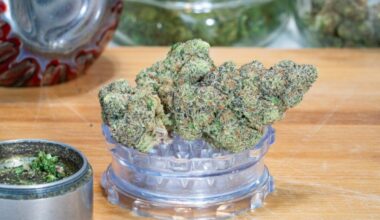A hemp merchant is suing Tennessee police for $850,000, claiming that authorities allowed hundreds of pounds of federally compliant hemp seized in a traffic stop to spoil and become illegal marijuana.
According to a federal civil rights complaint filed Friday, Andrew Smith was transporting 216 pounds of hemp, obtained from a licensed grower in Oklahoma, to a merchant in North Carolina , in October 2023 when he was stopped by police in Sevierville, Tennessee.
After using a “roadside test called MobileDetect,” police seized the shipment, which the lawsuit claims was accompanied by lab tests as well as approval from the “Tennessee and Oklahoma Departments of Agriculture” – demonstrating it was compliant with the 2018 Farm Bill that legalized hemp nationwide.
Another challenge for federal hemp ‘loophole’
Under that law, cannabis with less than 0.3% THC by dry-weight volume is considered hemp – and legal in the United States.
However, federal law does not account for THCA, or tetrahydrocannabolic acid, THC’s biosynthetic precursor, as many state laws do.
That oversight has led to what most observers agree is a “loophole” in the farm bill that’s allowed intoxicating cannabis products as well as products with intoxicating amounts of hemp-derived THC to be sold in states where marijuana is illegal.
Tennessee authorities have paid out hundreds of thousands of dollars to other hemp merchants whose products have been seized in similar circumstances.
In Smith’s case, he was later charged with drug crimes by local District Attorney Jimmy Dunn, but those charges were dropped, according to the suit.
Suit spells out authorities’ errors
In the meantime, authorities refused to return the seized hemp, perform second tests or store the hemp “under proper conditions,” according to the suit.
By the time the Tennessee Department of Agriculture tested the hemp in May 2024, it had “decarboxylated into illegal marijuana,” the suit claims, which “render(ed) it unsellable.”
According to Smith’s lawsuit, “naturally, over time, the amount of Delta-9 THC (in hemp) rises from the levels that make it permissible for legal sale and possession (no more than 0.3%) to levels that classify it as marijuana.”
The lawsuit names Dunn and Sevierville Police Chief Joseph Manning as defendants.
The suit seeks damages, including punitive damages and attorneys’ fees, as well as “an order compelling” Tennessee authorities to hire an expert to educate them on “the differences between hemp and marijuana.”
Medical Disclaimer:
The information provided in these blog posts is intended for general informational and educational purposes only. It is not a substitute for professional medical advice, diagnosis, or treatment. Always seek the advice of your physician or other qualified healthcare provider with any questions you may have regarding a medical condition. The use of any information provided in these blog posts is solely at your own risk. The authors and the website do not recommend or endorse any specific products, treatments, or procedures mentioned. Reliance on any information in these blog posts is solely at your own discretion.






